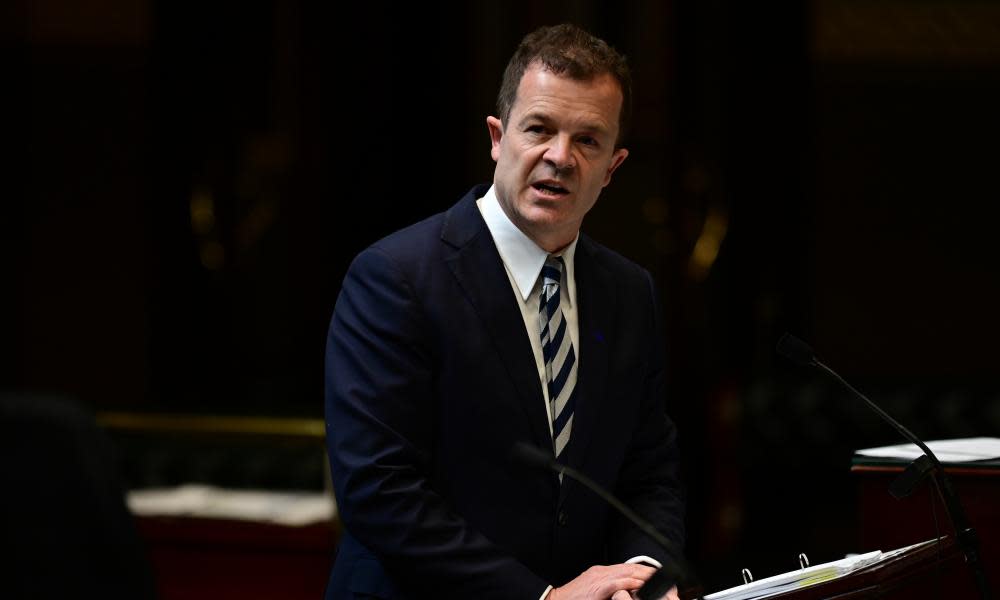NSW government urges federal Coalition to double paid domestic violence leave

The New South Wales government has urged the federal Coalition to reconsider its opposition to enshrining 10 days of paid domestic violence leave as a workplace right.
The NSW attorney general and minister for the prevention of domestic violence, Mark Speakman, told Guardian Australia his federal counterparts should consider adding paid leave to the national employment standards, following NSW’s lead to grant leave to its public servants.
Speakman made the comments ahead of the launch on Thursday of an Australian Services Union report into protecting home-based workers from domestic violence.
Related: A decades-long crisis: the battle to fix Australia's 'broken' family law system
The ASU will use the launch with Speakman and White Ribbon chief executive Brad Chilcott to renew calls for the federal government to legislate 10 days of paid domestic violence leave.
But the federal attorney general, Christian Porter, has already rebuffed the entreaty, suggesting the government will not reconsider until after a review in mid-2021.
In 2018 the Turnbull government legislated five days of unpaid leave following a Fair Work Commission decision to add the condition to modern awards.
The ASU report argues the Covid-19 pandemic has increased physical isolation, financial stress, unemployment, alcohol and drug use, and domestic and family violence.
On Wednesday, the prime minister, Scott Morrison, acknowledged the impact of the pandemic on women, telling an Our Watch forum that national cabinet had been reluctant to order a lockdown in part because “home is not always safe for a lot of women in this country”.
Speakman told Guardian Australia that paid leave “is critical in providing financial stability to people experiencing domestic and family violence”.
“The introduction of this reform to leave entitlements ensures that victim-survivors of domestic violence can seek safe housing, attend medical appointments or organise alternative care and school arrangements for their children without exhausting their other forms of leave.”
In January 2019, the NSW government introduced 10 days of paid domestic and family violence leave for NSW public-sector employees including teachers, nurses and police.
The condition is also included in some enterprise agreements between major employers and their workforce, including the Commonwealth Bank of Australia.
“I support my federal counterparts considering the adoption of the NSW policy as part of the national employment standards,” Speakman said.
Inclusion in the standards would require both public and private sector employers to fund the workplace right, although Speakman said the impact on small businesses “would need to be carefully assessed as part of any reform to the current standards”.
ASU NSW and ACT secretary Natalie Lang said that employers had benefited “from being able to transform people’s homes into a workplace” and they now “need to accept the responsibilities that come with that”.
Lang said leaving a violent family situation “generally takes a long period of planning” and legislating domestic violence leave would send the message that “applying for time off to take the steps necessary to escape abuse is entirely legitimate and it is endorsed by society”.
“Relying on piecemeal, ad hoc arrangements is inadequate.”
Porter noted the federal Coalition had already legislated five days of unpaid leave, which the Fair Work Commission decided was “the appropriate standard” after “consideration of the issue based on extensive submissions from unions, employers and other interested parties”.
“The Fair Work Commission has indicated it will revisit consideration of the issue in mid-2021,” he said. “Any further consideration at the commonwealth level would be informed by the FWC’s further consideration of the issue.
“Employers of course remain free to offer entitlements that suit their workplaces.”
Porter plans to introduce an omnibus industrial relations reform bill in the final sitting fortnight of the parliament, but the roundtables between unions and employers preceding it did not consider the issue of paid pandemic leave.
Related: Sally McManus cites 'concerning signs' government is prepared to support pay cut reforms
The bill is expected to contain improved rights for casual employees to convert to permanent work and processes for employers to rectify underpayments.
The Australian Council of Trade Unions has warned there are “concerning signs” the government could side with employer group plans to cut take-home pay, including a speech by Morrison to the Business Council of Australia earlier in November calling for a more flexible interpretation of the better off overall test.
• If you or someone you know is impacted by sexual assault, domestic or family violence, call 1800RESPECT on 1800 737 732 or visit 1800RESPECT.org.au


